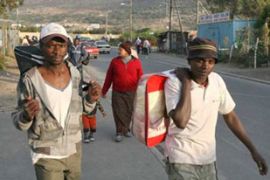Army kills man amid S Africa unrest
Troops shoot an individual as military is deployed to quell anti-immigrant violence.

Published On 24 May 2008
“A male was allegedly assaulting a woman. Our men confronted him and then he pointed a firearm at them,” Mangope said.
Army on the streets
The army was deployed on the streets of Johannesburg, the country’s largest city, on Thursday and again on Friday to help deal with a wave of attacks that have killed at least 42 people and seen 17,000 people displaced.
More than 500 people have been arrested in connection with the attacks.
Many immigrants from Zimbabwe, Mozambique and Malawi have been living in South Africa but have fled back to their homelands to avoid the violence.
African Union officials have expressed shock at the attacks in Africa’s most developed nation.
Civil unrest
Thabo Mbeki, South Africa’s president, bowed to pressure to call in troops after a request from the police.
It is the first time the army has been used to deal with civil unrest since the end of apartheid in 1994.
| Your Views |
|
Has South Africa’s government been too slow in tackling anti-immigrant violence? |
Attacks on immigrants, who are being blamed by many for South Africa’s high crime rate and unemployment levels, have spread to seven of South Africa’s nine provinces.
Some suggested the call to the military was an overreaction and raised fears about using troops who lacked the training to control crowds of people.
Many remember that, under white apartheid rule, the army was frequently called upon to help police put down civil unrest by blacks in poor townships and such incidents often ended in violence.
On Friday, Phumzile Mlambo-Ngcuka, South Africa’s deputy president, apologised for the unrest.
“We reject the notion that some of the people who are living in South Africa who are not South Africans can be blamed for the problems that we have,” she said during a trip to Nigeria.
But even as she apologised, violence was reported in Cape Town, South Africa’s second city and a major tourist destination.
Source: Al Jazeera, News Agencies